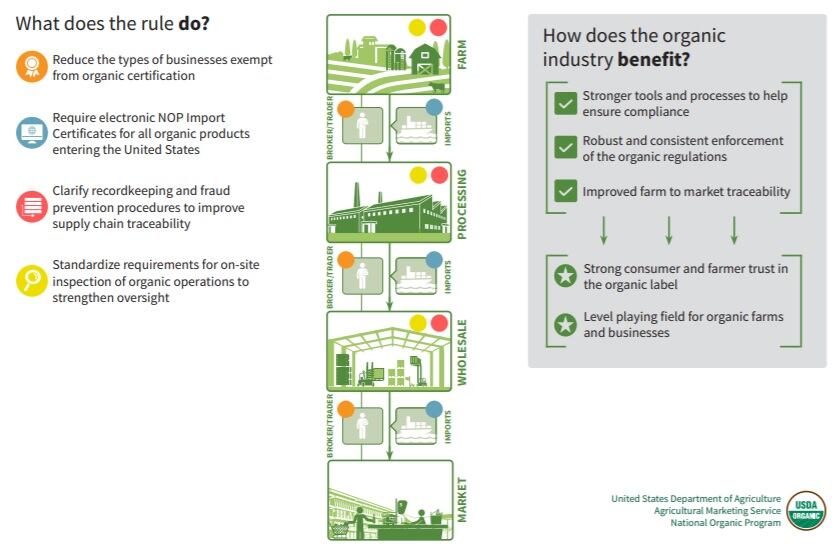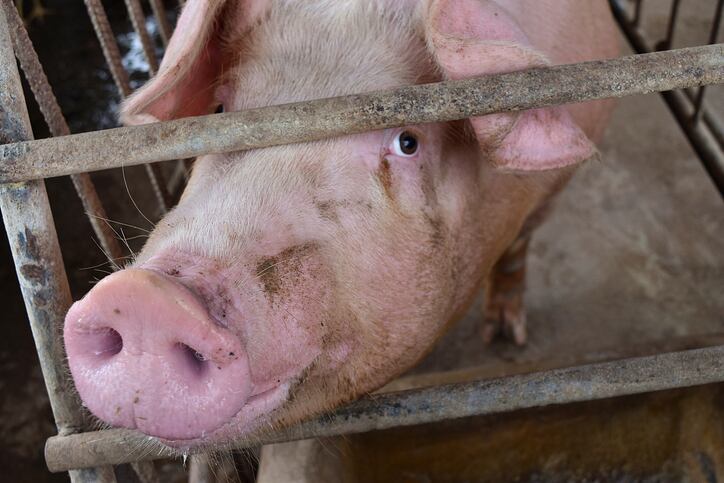In a proposed rule published today in the Federal Register, USDA seeks to “close gaps in the current regulations to build consistent certification practices to deter and detect organic fraud” in part by reducing the types of businesses exempted from organic certification, requiring electronic import certifications for all organic products entering the US, clarifying recordkeeping and fraud prevention procedures to improve supply chain traceability and standardizing on-site inspections of organic operations.
The proposed amendments to the National Organic Program (NOP) comes after years of clamoring by the industry for increased oversight and enforcement of the USDA organic regulations, which reached a crescendo in 2017 and 2018 when a journalist discovered some imports from Eastern Europe were falsely labeled as organic.
USDA acknowledges in the proposed rule that “the absence of direct enforcement authority over some entities in the organic supply chain, in combination with price premiums for organic products, presents the opportunity and incentive for organic fraud.”
It also notes increasingly complex organic supply chains to meet the rapidly expanding organic market’s demand further underscore a need for modern oversight and enforcement methods.
More businesses will need organic certification
As such, USDA proposes that NOP improve oversight at “critical links in the organic supply chain,” including at points that previously did not require organic certification in order to handle some organic products.
For example, previously if organic products were in a closed shipping container, some handlers need not be certified. But according to the proposed rule, organic certification will be required of businesses that buy or sell organic products, negotiate sales of organic products between buyers and sellers and possibly of brokers, traders, importers and exporters, as well.
Some retailers and transports may still not need organic certification under the proposal.
In addition to certification, which would open the door for audits and inspections, exporters and importers must request and review electronic NOP Import Certificates for all organic products entering the US. Exporters must request them of certifiers, and importers of exporters. Data from the import certificate must be uploaded into the US Customs and Boarder Protection’s Automated Commercial Environment at various points.
Improved traceability
To further improve supply chain traceability beyond pitstops with suppliers, importers and exporters, the proposed rule would require certified organic operations to maintain records of organic products’ source and chain of custody across the supply chain, identify products as organic on all records and labels and document monitoring practices.
The proposed rule also would outline for USDA-accredited certifiers how to identify high-risk products, verify their origin and chain of custody and share compliance related information.
Beyond this, the proposal calls for standardized requirements for on-site inspections, including that at least 5% of operations be certified annually.
OTA wrote the book on fraud prevention
While the Organic Trade Association lauded USDA’s and NOP’s “commitment to the integrity of organic” through the publication of the proposed rule, they also noted that many of the core call-outs mirrored those in its existing Organic Fraud Prevention Solutions program.
OTA began exploring fraud prevention and detection strategies in 2017 with the help of a 48-member task force to create a best practices guide, the components of which would be piloted before being required of member companies.
The resulting guide “is based on buyer responsibility and supply chain management, and provides companies with a risk-based process for developing and implementing an organic fraud prevention plan.”
It also is based on Michigan State University Food Fraud Initiative’s prevention model that has since been adopted by the Global Food Safety Initiative (GFSI) Food Fraud Think Tank and is required for GFSI compliance under the Food Safety Modernization Act and Preventive Controls Rule, according to OTA.
So far, OTA reports that 55 organic businesses are enrolled in the program, which includes an online training course that walks users through a fraud vulnerability assessment and how to implement an effective organic fraud prevention plan. If finalized, USDA’s proposed rule would require every certified organic operation to have such a fraud prevention plan in place.
OTA encourages those interested to sign up for the Organic Trade Association’s Fraud Prevention Solution while they await the proposed rule’s progression through the comment and review period.
The trade group also noted that it will work with a “diverse member task force” to respond to the proposed rule ahead of the Oct. 5 public comment deadline.




